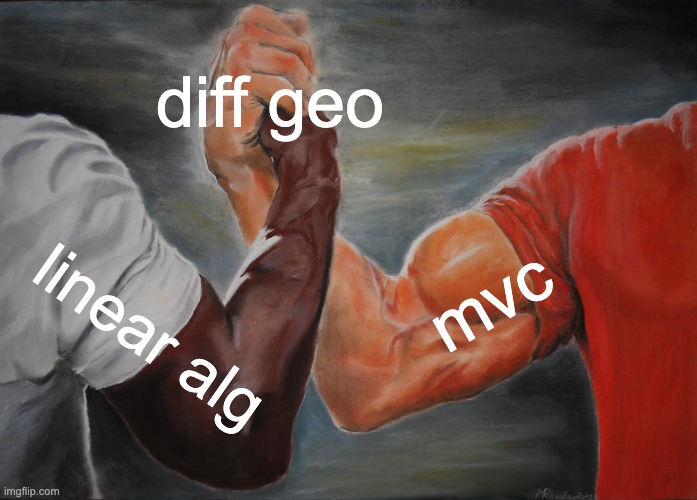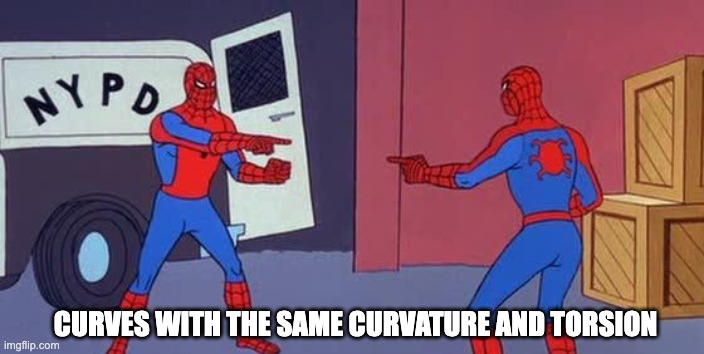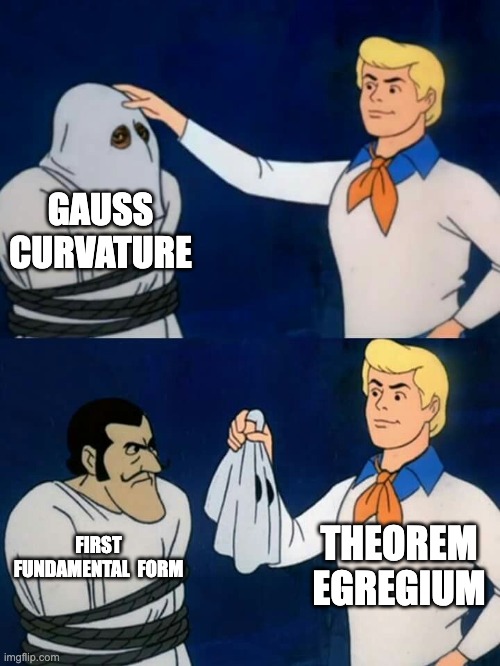Differential geometry (Math 1060)
Undergraduate course, Brown University, 2023
Announcements
- (11/24) Final project presentation rubric
- (11/24) My office hours this week will be by appointment only. Please email me if you want to chat (over Zoom). Gareth’s office hours are unchanged.
- (11/21) HW10 is posted below. It is due 12/1.
- (9/19) Office hours for the semester will be
- Tuesdays 4:30-5:30 in Kassar 304
- Wednesday 4:30-5:30 in Kassar 304
- Friday 3-4 in BarHol 160
Course information
This is an undergraduate course in differential geometry. The primary objects of study are curves and surfaces in 3-space. This course builds on multivariable calculus and linear algebra and could be a precursor to the study of manifolds, topology, and Riemannian geometry.
Course objectives
- learn basic properties of curves and surfaces (lengths, area, curvature, torsion) and how to compute them;
- prove foundational results (fundamental theorem of curves, theorem egregium, Gauss-Bonnet);
- understand theoretical trends in differential geometry (local vs global properties, intrinsic vs extrinsic quantities);
- improve your understanding of linear algebra and calculus by applying it;
- investigate various applications of differential geometry (isoperimetric inequality, regular isotopy of plane curves, knots, map-making, Euler characteristic/topology);
- improve your ability to read/write proofs and critique arguments;
- expose you to things you haven’t seen and challenge you through problem solving.
Recommended prerequisites
We will use multivariable calculus and linear algebra heavily and without much review during lecture. Some experience with writing proofs may be helpful.
Textbook
do Carmo, Differential geometry of curves and surfaces
Course expenses
Just the textbook. In practice, the text may not be absolutely necessary for the course, although you may want it as a reference.
Grading
homework 35%, midterm 30%, final project 30%, participation 5%
- a grade of 90% or higher is guaranteed an A
- a grade of 80% or higher is guaranteed an B
- a grade of 70% or higher is guaranteed an C
For students taking this course S/NC, a minimum grade of 70% and a minimum participation grade of 70% is required to guarantee a grade of S.
Contact information
- Instructor: Bena Tshishiku (bena_tshishiku at brown.edu)
- TA: Gareth Mansfield (gareth_mansfield at brown.edu)
Course events
Lectures: Tu-Th 9-10:20am in Salomon 202
Office hours:
- Bena: Tuesday and Wednesday, 4:30-5:30
- Gareth: Friday 3-4 (in BH 160)
Important dates:
- Midterm (take home): released Thursday, Oct 26 morning and due Friday, Oct 27 by midnight.
- Final projects: presented in class December 5, 7, 12
Homework
There will be weekly assignments posted below. The homework is designed to increase your engagement with the material, with your peers, and with me.
Collaboration: Please collaborate! Working together with your classmates can help you learn the material better. Some of the homework problems may be difficult, so it is recommended that you talk to someone when you are stuck. You are required to write your solutions alone and acknowledge the students you worked with. For any solution you submit, you should understand it well enough that you can explain it to someone else and answer questions about it. If you find yourself writing down things that you can’t explain, you should go back and think more about the problem.
LaTeX: Homework solutions must be typed in LaTeX. If you’re new to LaTeX, you can either download LaTex or use sharelatex which allows you download, edit, and compile LaTeX files online. See here for some commonly used symbols in LaTeX. Also Detexify is a useful tool for finding the commands for various symbols. The source code for the assignments should be a helpful guide. The most basic thing to know/remember is that math always goes in between dollar signs.
Late homework policy: For your homework grade, I will drop the score from your lowest assignment. View this as a one-time “get out of jail free card” in the event that you oversleep, forget, have a midterm, etc. As a general rule, late homework will not be accepted. If you have a medical emergency, I will ask for a note from a doctor or a dean. If you have an emergency that affects your ability to complete the coursework, please notify me as soon as possible.
Homework assignments.
HW1 (due 9/15). tex file (type your solutions in this file), solutions, student solutions
HW2 (due 9/22). tex file, image (include this image in the same folder as your tex file), student solutions
HW3 (due 9/29). tex file, image, solutions, student solutions
HW4 (due 10/6). tex file, student solutions
HW5 (due 10/13). tex file, image, student solutions
HW6 (due 10/19). tex file, student solutions
Midterm (due 10/27) student solutions
HW7 (due 11/3). tex file, student solutions
HW8 (due 11/10). tex file, student solutions
HW9 (due 11/17). tex file
HW10 (due 12/1). tex file
Participation
Occasionally, we may have small assignments or quizzes in class (randomly). These are graded on completion, more or less, and count toward the participation part of your grade (5%).
Attending class and taking notes is a basic part of course participation. If you have to miss class, I expect that you will get notes from a classmate.
Course materials
- For asynchronous discussions (e.g. questions about homework) we will use Ed Discussion. You should be able to access Ed Discussion from the course Canvas page.
- If you need additional references (outside of lecture and do Carmo), I encourage you to find the resource that works best for you. There are other popular texts by Banchoff-Lovett and Shifrin. You can also find further discussion on Wikipedia and Youtube.
Final Project
Working in groups of 2, you’ll choose a topic and give an 15-minute presentation during reading period.
The topic should be something related to the course that interests you. Below are some topic ideas to get you started, but you don’t have to choose one of these.
As part of completing the final project, I will ask you to submit:
- A project proposal (due 11/6) instructions
- A project outline (duel 11/13) instructions
- Final presentation slides (due 11/20) instructions
Some potential topics to get you started:
- proof of the isoperimetric inequality (Alyssa+Qinan)
- curve-shortening flow (Ethan+Nathan, Joohyun+Ben)
- Fundamental theorem of curves in higher dimensions (Tommy+Valentin)
- Willmore energy and Willmore conjecture (Dylan+Ahn)
- The optimal paper Mobius band (An+Phoebe, Aidan+Luke)
- four vertex theorem (Amy+Max, Lisa+Ryan)
- Crofton formula (Michelle+Andy)
- Gauss linking formula (Julian+Zeno)
- knotted curves and the Fary-Milnor theorem (Zach+Abigail)
- Plateau’s problem
- abstract definition of a Riemannian surface
- fundamental theorem of surfaces
- classification of compact surfaces with constant curvature
- navigation and rhumb lines
- Costa’s minimal surface
- the cycloid solves two physics problems
- differentiable Jordan curve theorem
- rotation index of simple closed plane curves
- characterization of geodesics by variation of arclength
- curvature characterization of convex plane curves
Tentative schedule (subject to change)
- Week 1: curves (do Carmo 1.1-1.3)
- Thurs (9/7). Introduction, curves, arclength
- Week 2: curvature and FTPC (do Carmo 1.5, 4.A, 1.A)
- Tues (9/12). unit speed parameterization, curvature, isoperimetric inequality
- Thurs (9/14). fundamental theorem of plane curves, isoperimetric inequality
- Fri (9/15). HW1 due
- Week 3: Frenet frame and FTSC (do Carmo 1.4-1.6, 5.7)
- Tues (9/19). torsion, Frenet frame, convexity
- Thurs (9/21). meaning of torsion, fundamental theorem of space curves, turning number
- Fri (9/22). HW2 due
- Week 4: surfaces (do Carmo 2.1-2.5)
- Tues (9/26). surface definition/examples, tangent vector/space
- Thurs (9/28). Normal vectors, orientability
- Fri (9/29). HW3 due
- Week 5: Gauss map and 1st FF (do Carmo 2.6, 3.1-3.3)
- Tues (10/3). Gauss map, surface area, first fundamental form
- Thurs (10/5). first fundamental form, normal curvature
- Fri (10/6). HW4 due
- Week 6: Gauss map and 2nd FF (do Carmo 3.2)
- Tues (10/10). second fundamental form; principal, Gauss, mean curvatures
- Thurs (10/12). No class
- Fri (10/13). HW5 due
- Week 7: curvature of surfaces (do Carmo 3.3, 3.5B)
- Tues (10/17). Curvature computations, umbilical points
- Thurs (10/19). Interpretations of Gauss and mean curvature
- Fri (10/20). HW6 due
- Week 8: Maps between surfaces (do Carmo 4.2)
- Tues (10/24). Isometric, conformal, area-preserving maps
- Thurs (10/26). Take home midterm (no class)
- Fri (10/27). Take-home midterm due at 11:59p.
- Week 9: Theorem Egregium (do Carmo 4.3)
- Tues (10/31). orthogonal charts, Theorem Egregium
- Thurs (11/2). orthogonal charts, surface “Frenet equations”
- Fri (11/3). HW7 due.
- Week 10: Gauss-Bonnet (do Carmo 4.5)
- Mon (11/6). Final project proposal due
- Tues (11/7). proof of theorem egregium, geodesics
- Thurs (11/9). Geodesics, Gauss-Codazzi equations, Gauss-Bonnet
- Fri (11/10). HW8 due.
- Week 11: additional topics
- Mon (11/13). Final project outline due
- Tues (11/14). geodesic curvature, parallel transport, local Gauss-Bonnet
- Thurs (11/16). local Gauss-Bonnet, hyperbolic geometry, global Gauss-Bonnet
- Fri (11/17). HW9 due.
- Week 12: additional topics
- Tues (11/21). hyperbolic geometry, global Gauss-Bonnet; Final project slides due
- Thurs (11/23). No class (thanksgiving)
- Fri (4/21).
- Week 13:
- Tues (11/28). No class (work on final project)
- Thurs (11/30). No class (work on final project)
- Fri (12/1). HW10 due.
- Week 14:
- Tues (12/5). final presentations
- Alyssa, Qinan: Isoperimetric inequality
- Dylan, Ahn: Willmore energy
- An, Phoebe: optimal paper Moebius band
- Ethan, Nathan: curve-shortening flow (properties)
- Thurs (12/7). final presentations
- Julian, Zeno: Gauss linking formula
- Joohyun, Ben: curve-shortening flow (application)
- Lisa, Ryan: four vertex theorem
- Aidan, Luke: optimal paper Moebius band (generalization)
- Tues (12/5). final presentations
- Week 15:
- Tues (12/12). final presentations (end of course)
- Tommy, Valentin: fundamental theorem of curves in higher dimensions
- Amy, Max: four vertex theorem converse
- Zach, Abigail: Fary-Milnor theorem
- Michelle, Andy: Crofton’s formula
- Tues (12/12). final presentations (end of course)



